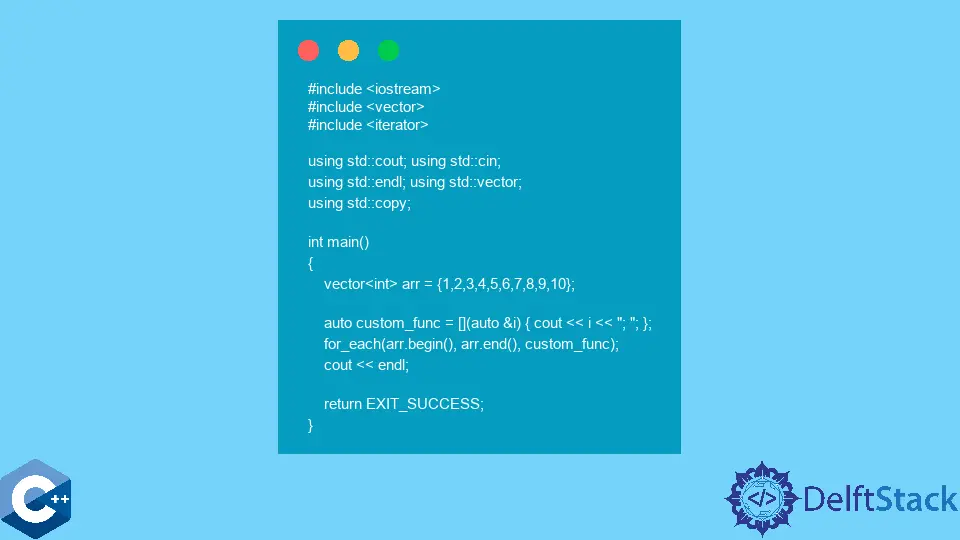如何在 C++ 中打印数组

本文将介绍将数组元素打印到控制台的 C++ 方法。
使用基于范围的循环来打印出一个数组
这个方法是一个典型的 for 循环,只是具有现代 C++11 基于范围的风格。基于范围的迭代提供了一个选项,可以通过自定义的指定符来访问元素,比如:通过 const 引用(auto const& i),通过值(auto i),或者通过转发引用(auto&& i)。与传统的 for 循环相比,此方法的优势是易用性和可读性。
#include <iostream>
#include <vector>
using std::cin;
using std::copy;
using std::cout;
using std::endl;
using std::vector;
int main() {
vector<int> arr = {1, 2, 3, 4, 5, 6, 7, 8, 9, 10};
for (auto const& value : arr) cout << value << "; ";
cout << endl;
return EXIT_SUCCESS;
}
输出:
1; 2; 3; 4; 5; 6; 7; 8; 9; 10;
使用 copy 函数打印出一个数组
copy() 函数在 STL <algorithm> 库中实现,为基于范围的操作提供了一个强大的工具。copy() 将范围的起始点和终点迭代器作为前两个参数。在本例中,我们传递一个输出流迭代器作为第三个参数,将 array 元素输出到控制台。
#include <algorithm>
#include <iostream>
#include <iterator>
#include <vector>
using std::cin;
using std::copy;
using std::cout;
using std::endl;
using std::vector;
int main() {
vector<int> arr = {1, 2, 3, 4, 5, 6, 7, 8, 9, 10};
copy(arr.begin(), arr.end(), std::ostream_iterator<int>(cout, "; "));
cout << endl;
return EXIT_SUCCESS;
}
输出:
1; 2; 3; 4; 5; 6; 7; 8; 9; 10;
作为另一种选择,我们可以很容易地重新实施上面的例子,以相反的顺序输出数组元素。我们修改 copy() 方法的前两个参数,并用 rbegin/rend 函数调用来代替它们,以实现这一目的。
#include <algorithm>
#include <iostream>
#include <iterator>
#include <vector>
using std::cin;
using std::copy;
using std::cout;
using std::endl;
using std::vector;
int main() {
vector<int> arr = {1, 2, 3, 4, 5, 6, 7, 8, 9, 10};
copy(arr.rbegin(), arr.rend(), std::ostream_iterator<int>(cout, "; "));
cout << endl;
return EXIT_SUCCESS;
}
输出:
10; 9; 8; 7; 6; 5; 4; 3; 2; 1;
使用 for_each 算法打印出数组
for_each 是 STL 库中另一个强大的算法。它可以将给定的函数对象应用于范围内的每个元素。在这种情况下,我们定义一个 lambda 表达式作为 custom_func 变量,并将其传递给 for_each 方法,对给定的数组元素进行操作。
#include <iostream>
#include <iterator>
#include <vector>
using std::cin;
using std::copy;
using std::cout;
using std::endl;
using std::vector;
int main() {
vector<int> arr = {1, 2, 3, 4, 5, 6, 7, 8, 9, 10};
auto custom_func = [](auto &i) { cout << i << "; "; };
for_each(arr.begin(), arr.end(), custom_func);
cout << endl;
return EXIT_SUCCESS;
}
输出:
1; 2; 3; 4; 5; 6; 7; 8; 9; 10;
Founder of DelftStack.com. Jinku has worked in the robotics and automotive industries for over 8 years. He sharpened his coding skills when he needed to do the automatic testing, data collection from remote servers and report creation from the endurance test. He is from an electrical/electronics engineering background but has expanded his interest to embedded electronics, embedded programming and front-/back-end programming.
LinkedIn